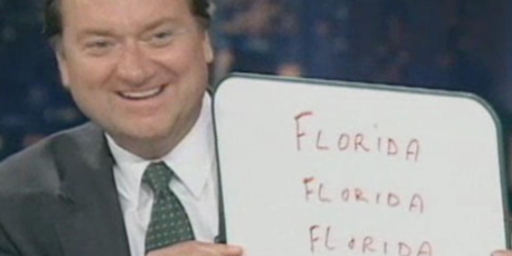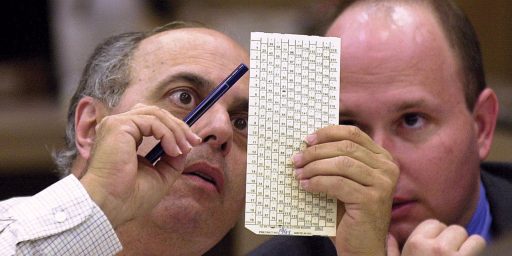JUDGES AND ELECTIONS
Stuart Taylor has an interesting piece entitled, “When Judges Should–nd Should No–Intervene In Elections.”
In any event, the large differences between the two cases help illustrate when federal judges should–and should not–intervene in elections. They also point to why, notwithstanding all the hysterical attacks by legions of law professors, Bush v. Gore was a reasonable interpretation of the Constitution.
The three judges, who are among the more liberal members of the famously liberal, often-reversed 9th Circuit, upheld a lawsuit by the NAACP and other groups seeking to postpone California’s recall vote for several months so that all of the state’s voters will be able to use new, more-accurate voting machines.
The court’s logic was so sweeping as to cast doubt on the constitutionality of the election systems of any and all states in which one or more counties buy modern, more-accurate voting machines sooner than others do. The crux of the opinion was that “voters in counties using pre-scored punch-card balloting will have a statistically more probable chance that their vote will not be counted than voters in other counties,” and that this violates the equal protection clause.
***
The constitutional problem in Bush v. Gore was not the fact that some Florida counties had used old, relatively error-prone punch-card voting machines. It was the rushed, chaotic, unreliable process that the Florida Supreme Court had invented–after Bush had won the machine recount mandated by the state’s election code–to keep alive Gore’s effort to overcome Bush’s freakishly small margin of victory. That court had invented a right to an unprecedented statewide manual recount, while allowing local elected officials to choose vote-counters and to use subjective, non-uniform, inconsistent, and thus easily manipulable, standards to decide whether to count ambiguously marked individual ballots as votes for Gore, Bush, or neither.
***
This brings me back to Bush v. Gore: While its legal analysis was sound, I wonder whether it would have been wiser for the justices to punt the 2000 election brawl to Congress. The reason is that the 5-4 conservative-liberal split that made Bush president gave rise to possibly unfair but entirely understandable suspicions that all nine justices were driven not by legal principle but by their partisan political preferences. Those suspicions were fanned by the fact that the five justices who overturned the Florida court are ordinarily more deferential to state courts and states’ rights than the four dissenters.




I always wonder at statements like “The three judges, who are among the more liberal members of the famously liberal, often-reversed 9th Circuit”. First, what’s the definition of liberal here? And secondly, what’s the problem with it?
Also, from what I can tell from my reading and research, the percentage of reversals is the same as any other circuit – 75%, and that’s 75% of something like 1% of the cases decided.
Isn’t this, as many on the right would say about the NYT, a blantant attempt at manipulation of the situation?
I mean, really…
John,
Certainly a valid point on the definitions, although the 9th circuit is consistently more leftist than others. Not surprising, given the judges are drawn from one of the more leftist parts of the country.
The numbers I’ve seen–and it’s been a couple of months now–indicate that the 9th is reversed more often as a percentage but, more importantly, their cases are reviewed much, much more frequently.
Yea, that’s my first point. If we’re a left part of the country, then what’s the problem? As to the last part, do you have some pointers?
I found this in a quick search. Now what’s interesting is that this (not so friendly) piece of information says that the 9th circuit is reversed 75% of the time, while last term, the 4th, 5th, 8th and 10th were reversed 100% of the time. The also state that “more than half (57%, or 8 of 14) of the federal appellate decisions the Supreme Court unanimously overturned came from the 9th Circuit. This means that a full one-third (8 of 24) of the 9th Circuit cases decided by the High Court were unanimously overturned.”.
The silly thing about this, as I see it, is that the 9th circuit presides over CA, which is the 5th largest economy on the planet, with 30 million people. Of course there’s going to be a heck of a lot of law done out here. We’re our own country for all practical intents and purposes (well, we don’t have our own military).
I don’t know. This sounds an awful lot like propaganda to me. The distortion of the statistics is pretty blatant, and the implications are pretty blatant, too.
Seems like the right here is pretty much doing the same thing they accuse the liberal press of doing.
JohnC, the point is that Circuit Courts aren’t intended to create different law in different parts of the country (indeed, federal law isn’t supposed to be different from one place to another; that’s the very essence of what equal protection is about); rather, they exist because the Supreme Court doesn’t have the resources to review every decision made by a lower court. Ideally, the 9th Circuit would be no more, or less, liberal than any of the other eleven (the 10 other numbered courts and the DC Circuit).
Chris:
Circuits have never worked like that, and they probably never will. As you know from the judicial politics literature, coding for whether or not the judge is “from the south” is an important move in describing judicial ideology.
The 9th circuit is more liberal, the 4th circuit is more conservative. I don’t see the big deal here, really, except that I think that the 4th Circuit is too deferential to prosecutors, too willing to deny criminal appeals, too willing to take executive determinations of things like “enemy combatant” status at face value, and so on. But there is going to be some variation — especially since the Supreme Court will never be able to monitor all courts effectively.
Brett:
I think that’s right. Indeed, regional variation in the circuits is, to an extent, another extension of federalism. Ideally, I’d like a uniform reading of the Constitution based on a reasonable interpretation of the intent of the Framers. But, since that’s not going to be the norm, we’re going to have regional variation since the circuit judgeships are filled from within the circuit and because Senators from the circuit have de facto veto power, especially if the nominee is from their home state.
I always wonder at statements like “The three judges, who are among the more liberal members of the famously liberal, often-reversed 9th Circuit”. First, what’s the definition of liberal here? And secondly, what’s the problem with it?
The problem comes in when they use extralegal means to legislate as they did here.
They often (as in this case) make ruling that have no basis in fact, law or reality. Being liberal is fine. Being delusional and extraconstitutional ain’t.
Brett, I wasn’t arguing that they ARE pure agents (with SCOTUS as the principal); I was arguing that they are INTENDED TO BE pure agents and–normatively, from my point of view–OUGHT TO BE pure agents.
For example, assume the 4th decided that Roy Moore’s fancy Ten Commandments display was just dandy, but the 9th decided a similar display was not. Clearly they both can’t be right about the meaning of the Constitution. (That is, after all, why SCOTUS tries to reconcile these sorts of things, with limited success due to strategic certiorari voting and a general desire to reduce its workload.)
I mean, the idea of regional variation in the circuits is nice from a fuzzy-wuzzy “regions’ rights” perspective, but it sort of flys in the face of equal protection that the justice one gets in the 9th is different from that one gets in the 4th. Maybe not as offensive to the idea of EP as “community standards” and similar weaseling by the Court, but offensive nonetheless.
—